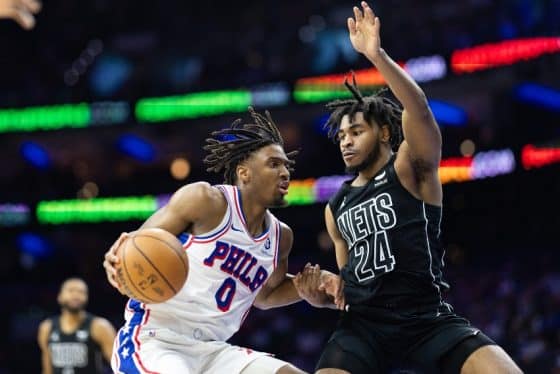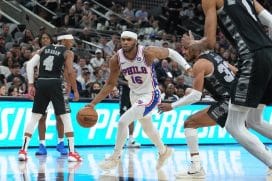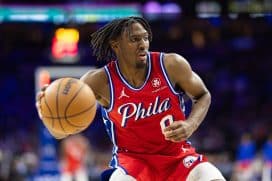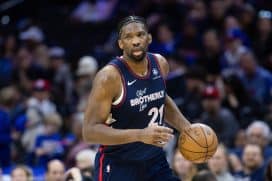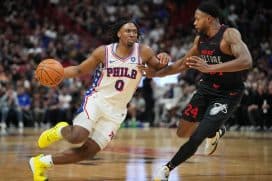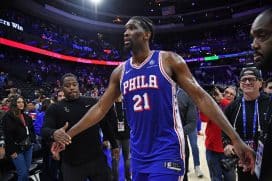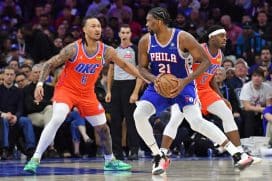By Dante Nelson, Sports Talk Philly staff
The Philadelphia 76ers were a team that originated in Syracuse, New York. Quite a few people know this. However, further research would indicate that there are some details that…well, are not common knowledge. Things like the team's first actual professional basketball season played. How did the team form? Why did they move to Philly?
So, I sat down with Curtis Harris. You may know him as "Pro Hoops History". Yes, the name makes it a little more clear: He's an expert when it comes to the historical side of basketball. He has a website with content you simply can't and won't find on other sites. So, I encourage you to check out the website and follow him on Twitter. Curtis, if you're reading this, I want to thank you again for this quick conversation.
I asked Curtis four questions. What follows is a copy and paste of the emails. After the interview, I'll share some of my thoughts on the Nationals' history and some things I learned from Curtis.
Q: So, most people see the Syracuse Nationals as a team that showed up in 1949-50. But, in my brief research, I've noticed they've been around longer than that. I have seen as early as 1946. Any knowledge to the team's first year of existence you could add?
Curtis: The Syracuse Nationals franchise began play in the 1946-47 National Basketball League (NBL) season. The reason why most people might think the franchise began in 1949-50 is because that's the first season of the NBA. In August 1949, the NBL and the Basketball Association of America (BAA) merged to create the NBA. Unfortunately, the NBA does not officially recognize the stats and records of the NBL, even while it acknowledges those of the BAA. I think that is largely why the franchise's NBL years are largely unknown to most basketball fans.
Q: Can you give us a little story on how the Nats came to existence? Like, who was the owner? Why Syracuse?
Curtis: The precise details are somewhat disputed, but basically the Nationals came into existence because Danny Biasone couldn't get the NBL's Rochester Royals to schedule an exhibition game in Syracuse. Biasone, an Italian immigrant and bowling alley owner in Syracuse, was piqued at the snub and sent a check to the NBL's league office in Chicago to create a franchise of his own: the Nationals. (Les Harrison, who owned the Royals, denied he snubbed Biasone). In any case, the Nationals were formed in time for the 1946-47 season.
Q: Have the Nats ever been in serious danger of shutting down (before the move to Philadelphia)?
Curtis: During their time in Syracuse, the Nationals were never in serious danger of shutting down. Biasone was a good owner and solidified his franchise's financial and talent base in the early 1950s thanks to general manager Leo Ferris, who along with Biasone co-created the shot clock in 1954. The franchise made the playoffs every year from 1947 to 1972, still the longest streak in NBA history. So they could always count on playoff revenue to bolster the finances. Ultimately, what pushed the Nationals to Philadelphia were larger economic forces. Syracuse was the last mid-size city left in the NBA in 1963. Minneapolis, Fort Wayne, and Rochester had all lost their NBA teams as the costs of running a pro sports team increased. Salaries were rising as were travel costs due to the geographic expansion. So, in 1963, Biasone sold the Nationals for $500,000 and they were moved to Philly.
Q: Most people that know about the Nationals will look at Hal Greer, Dolph Schayes, and even Red Kerr. But, who would you say is an underrated member of the Nationals?
Curtis: Three important members of the Nationals who are underrated (or largely forgotten) are Larry Costello, Paul Seymour and Al Cervi. Seymour joined the franchise for the 1947-48 NBL season and played his final game for the franchise in the 1959-60 season. Along the way he was a three-time NBA All-Star and served as the club's player-coach from 1957-60. Al Cervi joined in 1948-49 season as player-coach leading the team to the 1955 NBA title. He retired from playing in 1953 but kept coaching until 1957 when Seymour took over the duties. Lastly, Larry Costello was a six-time All-Star with the franchise. He joined in the 1957-58 season and stayed on through the 76ers days retiring in 1967-68.
So…where do I start? Absolutely great stuff, here. The first time I ever wrote about the Sixers was my own blog called "National Sixers" as I paid tribute to the old and current name of the team. That was in 2011. Even before then, I was fascinated by the Sixers and their history. I love this team on many levels which is why I talk about the Sevens and Team Dignitas. I'm all in.
I hadn't realized that the Nationals' stats were not counted. My goal is to dig deep to find those stats and show you guys what they did. Really messed up the NBA decided not to count the NBL. But, yes, technically, the Nationals/76ers are one of the original teams of the NBA even before the NBA.
I love the team's origin story, here. It seems Biasone created the team out of spite. The Royals of course, are the Sacramento Kings. Is there a hidden rivalry, here? I did talk about some it in my post on trying to figure out who the best New York team was between the Nats, Royals, and New York Knicks. But, I do wonder if there was more to things. Makes me think. Perhaps another article for another day.
The move to Philly seemed inevitable. Like Curtis said, even with being a good owner, things just got too big for the league. Most small towns couldn't keep up. In today's NBA, it's probably the same deal. It's a narrative for why some stars in the league go to the bigger cities like LA or NY (Philly is a big city but I guess not as "bright"). So, it's harder for the "small" markets in that sense.
I knew about the shot clock. I think I didn't know (vs forgetting) about the playoffs streak. The Sixers have pioneered a couple of recent NBA moves. They were the first to get a deal done with Stub Hub to put ads on jerseys. They also dove into the esports world first. So, yesterday and today, the Sixers set standards. That's how they roll. Shucks, you could toss in The Process. We haven't seen something like that before.
See, because I have spent years studying the team, those players are not "unknown" or "underrated" to me. But, I can see how plenty of others wouldn't know those names. It's a shame they got rid of the player-coach position/role. You know, there's a hybrid thing going on today: Coach and President of the team. It's really interesting. The coach literally gets to select his players. So, if you fail (Glen Rivers who is also known as "Doc" but you can ask Marc Zumoff why he'll never be known as "Doc" in Philly), you FAIL. If you succeed (Gregg Popovich), you're awesome.
Nah, but that player-coach thing sort of still exists. There are certain players who are extensions of the coach on the court and are very respected to the point they can make calls on plays. Also, players tend to "respect" former players more. Those coaches know the grind. The work. The battle. It's easier to relate. But, yeah, players can't also serve as coaches.
So, those were my thoughts. I may have run into a couple of ideas for new posts. We'll see. Did you learn anything new about your Sixers?

